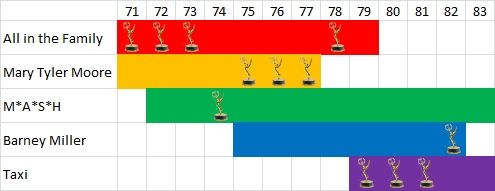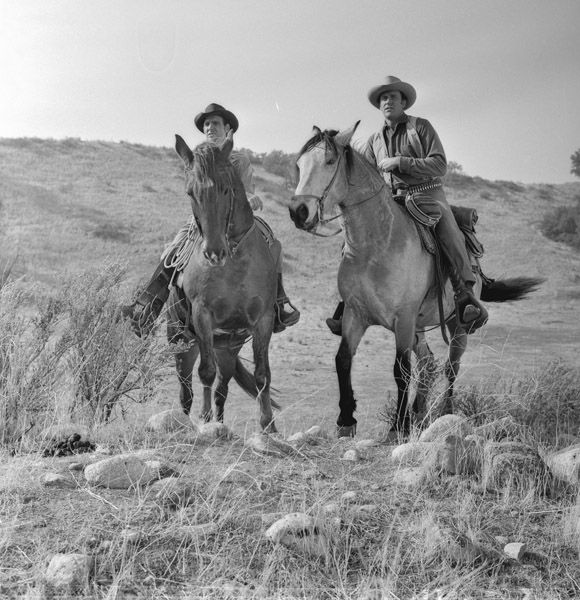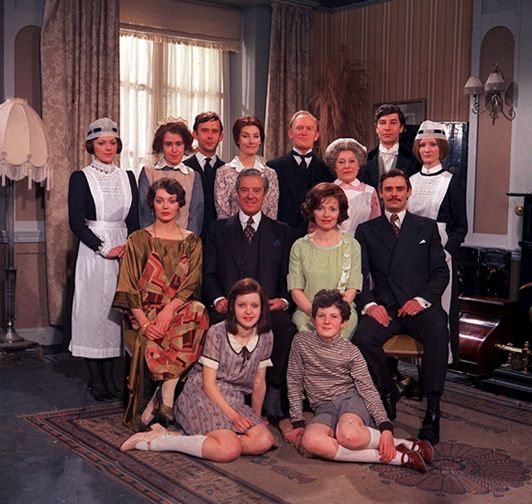This week on Cinemath . . . Actually, this week it’s Telemath since the feature subject is the Emmys. The 65th Primetime Emmy Awards air next Sunday to honor the finest of the 2012-13 television season. It’s the perfect time to look back over six decades of Emmy history to examine how long Emmy winners and nominees stay on the air, when in that run they are first recognized by Emmy voters, how often a show is nominated or wins the Emmy after the first taste, and much more.Hit the jump for answers to all the Emmy questions you never knew you had.First, a few general notes:
- This article considers nominees and winners of Outstanding Drama Series and Outstanding Comedy Series. Most years have equivalent categories, even if the award is called something else (i.e. Outstanding Program Achievement in the Field of Drama). But in 1957, the top two categories were Best Series: Half Hour or Less and Best Series: One Hour or More. In 1965, all shows were grouped into one broad category, Outstanding Program Achievements in Entertainment. For these years, a nomination or win in the top categories is counted for a show that would otherwise qualify for Outstanding Drama/Comedy.
- The drama dataset starts with the 1951 Emmys. The comedy dataset starts with the 1953 Emmys. This cutoff point unfortunately discounts the season of shows that were on the air prior to 1951. Likewise, future seasons of shows currently on the air are not included for obvious reasons. This skews the data a bit.
- Wins and winning percentages are counted through 2012. Nominations are current through 2013.
This is going to be a whole mess of information, so the least I can do is put it in bullet points. Punctuated by graphs. And one diagram! Let's start with the comedies.
Outstanding Comedy
- 107 different comedies have been nominated for Outstanding Comedy—31 comedies have won the award.
- The average Emmy nominee has 2.8 nominations, runs for 5.9 seasons (and counting, since this average includes nominees that are still on the air), and is nominated in 52.2% of its seasons.
- The average Emmy winner has 5.1 nominations, runs for 7.0 seasons (again, and counting), and wins 14.1% of its nominations.
The column chart below shows the distribution of how many season Emmy-winners (blue) and Emmy-nominees (green) were on the air. (Note: Javascript must be enabled to view these Google charts.)
- 16 of the 31 winners (52%) only won one Emmy. Frasier leads the field with 5 wins. Cheers, All in the Family, and The Dick Van Dyke Show all have 4 trophies. The Mary Tyler Moore Show, 30 Rock, and Modern Family have won 3 each. Either 30 Rock or Modern Family could join the 4-win club if it wins at the 2013 Emmys.
The scatterplot below shows the number of Outstanding Comedy wins for each winner, organized by the year of the first win. Hover over a data point to see the name of the show.
- 15 of the 31 winners (48%) won their first Emmy for their season.
- A comedy that was nominated for one season was also nominated for its next season 67.3% of the time.
- 7 of the 31 winners (23%) won their first nomination and never won again. The Monkees, The Cosby Show, The Wonder Years, and Arrested Development won for season one. Make Room for Daddy, Will & Grace, and The Office won for season two.
- That doesn’t include The Bob Newhart Show (a Newhart-hosted variety show that premiered in 1961) and My World and Welcome to It. Both won the Emmy for their debut season, but were cancelled before they could try again in season two.
- The Bob Newhart Show and My World and Welcome to It are two of the three comedies to win Outstanding Comedy every season they were on the air. Modern Family won each of its first three seasons and hopes to make it 4-for-4 at this year’s Emmys. Four comedies have been in this situation before. All in the Family, Taxi, and 30 Rock lost their fourth nomination after winning three straight. Only Frasier won that fourth nomination, and proceeded to win a fifth Emmy the year after.
- 17 of 107 nominees (16%) were nominated every season they were on the air.
- 20 of the 31 winners (65%) won on their first nomination. A Nobel-esque queue built up in the 1970s. All in the Family and The Mary Tyler Moore Show both premiered during the 1970-71 season. All in the Family won three in a row before M*A*S*H, which premiered in 1972, won for its second season. The Mary Tyler Moore Show waited patiently for its first win for season five. All in the Family won one more before Taxi premiered in 1978 to three straight wins. Barney Miller, which premiered in the middle of the fray in 1975, finally won for its eighth and final season after six straight unsuccessful nominations. Since that did not make sense, here's a diagram:
- Friends waited the longest to win. Friends was nominated for its first season, but premiered in 1994 during Frasier's five-year run as Best Comedy. Friends was nominated on and off for the next several years, and even though it wasn't nominated in 2001, the show finally won Outstanding Comedy in 2002 for its eighth season.
- Only 4 comedies won the Emmy in nonconsecutive years. All in the Family premiered to three Emmy wins from 1971-1973, and took a five-year break before winning one more in 1978 for season eight. The Jack Benny Show (1959, 1961) and Murphy Brown (1990, 1992) each went 2 for 3 in the middle of their runs. Cheers opened its 11-season nomination streak with two wins in 1983 and 1984, waited until 1989 for the third win, and closed with one final win in 1991.
Head to page 2 for the stats on Outstanding Drama
Page 2
But before you do, check out this word cloud (created on Wordle) for the Outstanding Comedy nominees weighted by number of nominations. Bigger font size means more nominations.
Return to page 1 for the stats on Outstanding Comedy
Outstanding Drama
Note: Because the analysis is dependent on how many seasons each show ran, limited series that were nominated or won Outstanding Drama are omitted from the dataset.
- 122 different dramas have been nominated for Outstanding Drama—33 dramas have won the award.
- The average Emmy nominee has 2.5 nominations, runs for 6.0 seasons (and counting, since this average includes nominees that are still on the air), and is nominated in 51.5% of its seasons.
- The average Emmy winner has 4.1 nominations, runs for 7.3 seasons (again, and counting), and wins 13.1% of its nominations.
The column chart below shows the distribution of how many season Emmy-winners (blue) and Emmy-nominees (green) were on the air. (Note: Javascript must be enabled to view these Google charts.)
- 21 of the 32 winners (64%) only won one Emmy. Hill Street Blues, L.A. Law, Mad Men, and The West Wing lead the field with 4 wins. Mad Men could take the lead if it wins a fifth trophy at the 2013 Emmys.
The scatterplot below shows the number of Outstanding Drama wins for each winner, organized by the year of the first win. Hover over a data point to see the name of the show.
- 14 of the 33 winners (42%) won their first Emmy for their season.
- A drama that was nominated for one season was also nominated for its next season 58.6% of the time.
- 9 of the 31 winners (29%) won their first nomination and never won again. (10 if you count Homeland, which won for its debut season at last year's Emmys and will have plenty of opportunities to win a second.) Lost, Marcus Welby, M.D., Pulitzer Prize Playhouse, The Waltons, and thirtysomething won for season one. Producers' Showcase won for season 2. The Fugitive and Gunsmoke won for season 3. The Rockford Files had to wait until season 4.
-
Gunsmoke had a funny relationship with the Emmys. The first season was nominated for Best Action or Adventure Series, but lost to Disneyland. James Arness received the first of three consecutive acting nominations for the second season's only nomination. Gunsmoke won Best Dramatic Series with Continuing Characters for season three, and yet was never nominated again for Outstanding Drama over the rest of its 20-season run.
- 19 of 122 nominees (16%) were nominated every season they were on the air.
- 18 of the 33 winners (56%) won on their first nomination.
- Only L.A. Law and The Sopranos won the Emmy in nonconsecutive years. The Sopranos stormed on to the scene in 1999, but the scene was still dominated by broadcast television. The Practice repeated as champion in 1999 (pause: The Practice?!), then The West Wing dominated from 2000-2003. The Sopranos finally won in 2004 for season 5. The mob drama was not eligible for the 2005 Emmys and lost to 24 in 2006, but returned for a farewell win in 2007 for its final half season.
- Star Trek: The Next Generation earned the most notable farewell nomination. Seasons 1-6 received plenty of technical nominations/wins. The seventh and final season was the first to be nominated for Outstanding Drama, one of 10 nominations for TNG that year. (Friday Night Lights ranks second in my book—limited recognition seasons 1-4, then in season 5: Best Drama nomination and wins for Kyle Chandler and Jason Katim's series finale script.)
-
British import Upstairs, Downstairs had an amazing yet peculiar run in the 1970s. The series premiered in the UK in 1971. By the time Upstairs made it to the US in 1974, 26 episodes were produced for the first two seasons. PBS chose to air 13 in the first US season (the remaining 13 later aired in 1989). The show won Outstanding Drama Series in 1974 and 1975, somehow switched categories to win Outstanding Limited Series in 1976, then somehow switched back to win Outstanding Drama Series in 1977 for its final season. I ultimately could not figure out how to include it in the drama dataset when I omitted limited series, but I want to acknowledge the amazing feat: Upstairs, Downstairs won top honors for its category in all four periods it was eligible.
- Also amazing but less admirable: Picket Fences won for its first two seasons, then wasn't nominated again for Outstanding Drama in the two remaining seasons, although it won 6 more Emmys on 9 nominations (mostly for acting).
- I'm a big fan of the random nomination—one stray nomination in the middle of a long run. Lassie was nominated in season 4 and ran for 19 seasons. Hawaii Five-O was nominated for the fifth of 12 seasons. Both The F.B.I. and The Eleventh Hour were nominated in season 4 in the middle of a 9-season run. Bonanza takes the cake: 14 seasons, one nomination in Season 7.
- I'll end on a stats nerd note. The distribution of the first season that dramas are nominated for Best Drama follows the geometric distribution with probability 0.5. That implies that an Emmy-caliber drama has a 0.5 chance of earning its first nomination every season starting with season one. This is not the case with comedies, so there may be no useful interpretation, but it’s always cool when data matches theory. The column chart below compares how many dramas earned the first nomination for each season (blue) and the number predicted by the geometric distribution (purple).
Nah, that's too stats nerdy. Let's close this out with a word cloud (created on Wordle) for the Outstanding Drama nominees weighted by number of nominations. Bigger font size means more nominations.






